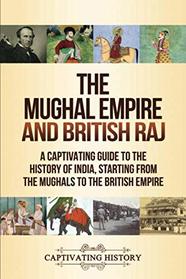The Mughal Empire:
In the realm of human history, the Mughals were only a dynasty for about 300 years. During that short blip in human history, something magical emerged -- the Taj Mahal. Civil war and strife were common when a Moghal leader died because the princes had to prove their power in order to rise to the role of ruler. Fratricide and imprisonment of family members were common ways to "win" the crown.
Captivating History does an exceptional job in the final pages of this section of the book. The author explains how common people lived in this very different atmosphere. Muslims and Hindi lived together but did not mingle because of their very different belief systems.
British Raj:
This volume explains the overall picture of the association that the British had with the Indians. I was surprised to learn that India paid for England's Industrial Revolution. Both countries benefited from their association financially but I doubt Indians were particularly thankful for the British rule. The British were fairly dismissive of Indian culture and religions.
The fact that millions of Indians died (due to famines) while under British rule was truly shocking. There were trains that could have moved the plentiful harvests to the areas of famine but the British used the trains for taking exports out of the country. One of the voices calling for change was that of Florence Nightingale. While she was in India, she wasn't shy about explaining how the famines could be stopped (using some of the trains to move foodstuffs to the indigent).
Before the British came, India was a patchwork of multiple cultures and religions living side-by-side. The splitting of Bengal caused a nationalistic wave of enthusiasm to cover India. The story of Mahatma Gandhi was particularly interesting and compelling. Gandhi's Salt March laid the foundation for India's independence and the repetition of nonviolent protests around the world by future leaders.
In the realm of human history, the Mughals were only a dynasty for about 300 years. During that short blip in human history, something magical emerged -- the Taj Mahal. Civil war and strife were common when a Moghal leader died because the princes had to prove their power in order to rise to the role of ruler. Fratricide and imprisonment of family members were common ways to "win" the crown.
Captivating History does an exceptional job in the final pages of this section of the book. The author explains how common people lived in this very different atmosphere. Muslims and Hindi lived together but did not mingle because of their very different belief systems.
British Raj:
This volume explains the overall picture of the association that the British had with the Indians. I was surprised to learn that India paid for England's Industrial Revolution. Both countries benefited from their association financially but I doubt Indians were particularly thankful for the British rule. The British were fairly dismissive of Indian culture and religions.
The fact that millions of Indians died (due to famines) while under British rule was truly shocking. There were trains that could have moved the plentiful harvests to the areas of famine but the British used the trains for taking exports out of the country. One of the voices calling for change was that of Florence Nightingale. While she was in India, she wasn't shy about explaining how the famines could be stopped (using some of the trains to move foodstuffs to the indigent).
Before the British came, India was a patchwork of multiple cultures and religions living side-by-side. The splitting of Bengal caused a nationalistic wave of enthusiasm to cover India. The story of Mahatma Gandhi was particularly interesting and compelling. Gandhi's Salt March laid the foundation for India's independence and the repetition of nonviolent protests around the world by future leaders.




